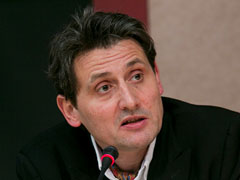Frédéric Gros visited the CCCB on 26 November 2014 to give the lecture “In Praise of Adventure: Paradoxes of Security”. In his lecture, Gros advocated the simple act of walking in the street as a solution to present-day problems raised by the concept of security.
Frédéric Gros, Professor of Philosophy in the Faculty of Arts and Human Sciences at the Paris-Est Créteil Val-de-Marne University, and of Political Thought at the Institute of Political Studies (Sciences-Po) in Paris, visited the Centre of Contemporary Culture (CCCB) on 26 November 2014 to give the lecture “In Praise of Adventure: Paradoxes of Security”, as part of the series titled “In Praise of Adventure”. He was presented by Miguel Morey, Emeritus Professor of Philosophy at the University of Barcelona. In his lecture, Gros advocated the simple act of walking in the street as a solution to present-day problems raised by the concept of security.
Gros began by reviewing the different meanings that the word “security” has had in western history, singling it out as one of the motors of change in philosophical and social thought. Among the different meanings one finds still linked with the concept today, he said, are the ideas of “tranquillity of spirit” of the classical philosophers – the Greek notion of ataraxia (robust tranquillity or freedom from distress and worry), which we call “serenity” nowadays – “absence of danger” before an enemy of Christianity, “that which protects the State”, according to modern contractualist philosophers – the protection of basic rights of individuals – and today’s “biosecurity”.
With this latter term, which he has coined following Foucault’s concept of biopolitics, Gros sees security as an “accessory to flows”, or a response to the requirement of bringing order to the massive movement of people, goods and data which characterises our times. The threefold need to protect, monitor and regulate these flows gives rise to a highly controversial problem: to whom does the informational imprint of our existence belong? To the state? To companies? To us? Given these questions, Gros warns of the danger entailed in leaving security in private hands since, if this should observe the laws of supply and demand, there is a risk that companies might have an interest in encouraging insecurity in order to increase their profits.
Yet Gros goes still further in his approach to resolving the controversy and argues in favour of moving on foot, walking, the condition of the wayfarer, as a way of recovering ancient values which are fruit of the physical presence of public space. These are values that range from the need to interact with others through to the desire for intimacy. Gross says that we should use public space as a way of exercising thinking, making the most of experiences we have through our physical presence in places, the effort of arriving there, and enjoyment of the anonymity we might find. He also warns against technologies which promise comfort or time saving, thus encouraging the obsession with speed. In this regard, he favours actions like walking, which expand time and give it quality, actions we might turn to in order to combat the so-called “modern hyperindividualisation”, while also being able to exercise, as a form of resistance, rights such as those of being forgotten or anonymous. The fact of walking highlights the political dimension of public space, whether it is in a demonstration or in the use of vehicles which express a certain social status. Gros therefore invites the citizen to wander round the streets and enjoy the benefits that brings; “walking may not make us more intelligent, but it does make us more disposed to think”.



